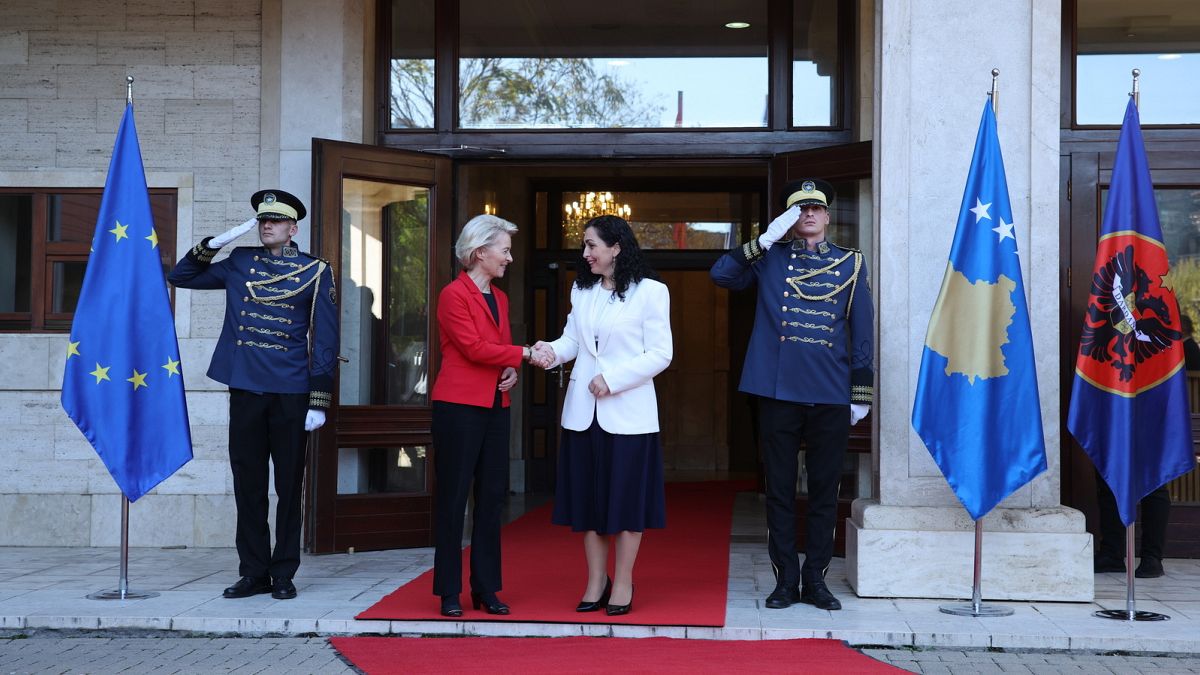European Commission chief Ursula von der Leyen vowed to bring the economies of the Western Balkans and the European Union 'closer' on Monday as she began a four-day tour of the region.
Speaking in the capitals of North Macedonia and Kosovo, von der Leyen pledged to double both countries' economies in the next decade as part of the EU's €6 billion growth plan for the Western Balkans, seen as a stepping stone to EU accession.
But the path to EU membership can only open up if political reforms are implemented in both countries, according to von der Leyen.
In Pristina, she said success is dependent on the normalisation of relations between Serbia and Kosovo, which have come under immense strain since a Kosovar policeman was killed by armed paramilitary troops trained in Serbian military bases in late September.
The EU's growth plan will see Western Balkan companies gain access to the EU's single market in seven sectors in exchange for key reforms, including ensuring sound public administration and finances, the independence of the judiciary and a crackdown on corruption. The Commission will publish an assessment of countries' progress in meeting the reforms on November 8.
The EU will also inject money into strategic investments to incentivise such reforms and to bring the two blocs' economies closer together. The Western Balkan region could see its GDP jump by 10% as a result, von der Leyen said on Monday.
"The economy of Kosovo is at 27% of the EU average income, so there is a lot of untapped potential," von der Leyen said in a joint press conference in Pristina with President Vjosa Osmani.
"We should try to double your economy within a decade," she added, making the same pledge earlier in Skopje to North Macedonian Prime Minister Dimitar Kovačevski. The North Macedonian economy stands at 42% of the average income in the EU.
But von der Leyen emphasised to both Osmani and Kovačevski that political reforms need to be delivered for money to be disbursed under the growth plan and for the process of accession to the EU to progress.
'Success' dependent on reforms
In Kosovo, von der Leyen issued a warning that the relations between Belgrade and Pristina must be normalised before Pristina can benefit from the growth plan or progress on the path to EU membership.
"We all have our history," von der Leyen said. "The history of enlargement is a history of countries that came out of the Second World War. It is a history of peace and of reconciliation and of normalisation of relations, and therefore this is a precondition to join the European Union."
"We all know we only can achieve all these steps forward and successes if Kosovo and Serbia normalize relations. It is absolutely crucial for both to engage, to cooperate," she added. "And we've discussed the topic together that Kosovo could launch the procedure to establish the Association of Serb-majority municipalities."
EU leaders - including the French President, the German Chancellor and the Italian premier - failed to broker an agreement during discussions last week on the increasing tensions between Belgrade and Pristina.
The bloc wants Kosovo to establish a so-called association of Serb-majority municipalities in the north of the country, and for Serbia to "deliver on de-facto recognition" of Kosovo, which it continues to consider its province despite Kosovo declaring independence in 2008.
Von der Leyen will meet Serbian President Aleksandar Vučić in Belgrade on Tuesday.
Skopje, meanwhile, has already taken steps to amend its constitution to recognise the Bulgarian minority living within its territory and annually review its relations with Sofia, in a French-brokered deal aimed at lifting Bulgaria's veto on opening EU accession talks.
But the changes are being blocked by the main conservative opposition party, VMRO-DPMNE.
"The first steps have been taken in your parliament – and that is good news," von der Leyen said in reference to the North Macedonian constitutional reform. "Now, I hope that all parties will seize this opportunity to move forward. Because there is a true momentum now, all over the European Union and those countries who want to join the European Union, for the enlargement process."
This article was amended as it erroneously said the EU's growth plan for the Western Balkan was worth €60 billion, instead of €6 billion.
